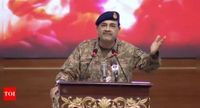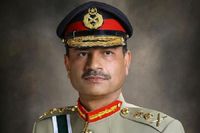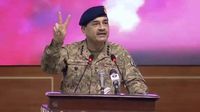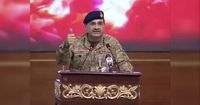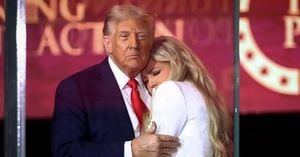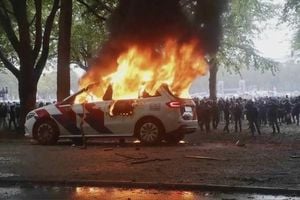ISLAMABAD: In a stirring address at the Overseas Pakistanis Convention on April 16, 2025, Pakistan Army Chief General Asim Munir reaffirmed the controversial "two-nation theory," which posits a fundamental divide between Hindus and Muslims as the basis for Pakistan's creation. Munir emphasized that this ideological framework is essential for the identity of the nation, urging parents to pass down the historical narrative of Pakistan to their children.
Addressing a gathering that included Prime Minister Shahbaz Sharif, Munir stated, "You have to narrate Pakistan’s story to your children so that they don’t forget it when our forefathers thought we were different from Hindus in every possible aspect of life." He elaborated that the differences in religion, customs, traditions, thoughts, and ambitions were the foundation upon which the two-nation theory was established. "We are two nations, we are not one nation," he declared, reinforcing the notion that these differences justified the creation of Pakistan in 1947.
Munir's remarks come at a time when tensions between India and Pakistan are particularly heightened, especially regarding the Kashmir issue. He referred to Kashmir as Pakistan's "jugular vein," insisting that the country would not abandon its claims. "Our stance is absolutely clear, it was our jugular vein, it will be our jugular vein, we will not forget it. We will not leave our Kashmiri brothers in their heroic struggle," he stated, echoing sentiments that have been a part of Pakistan's narrative since its inception.
In addition to discussing national identity, Munir addressed the ongoing security challenges in Balochistan, a region plagued by insurgency and violence. He vowed to eliminate all threats posed by terrorist groups, stating emphatically, "Even ten generations of terrorists cannot harm Balochistan and Pakistan." This statement came in the wake of a significant incident on March 11, 2025, when the Balochistan Liberation Army (BLA) hijacked the Jaffar Express train, resulting in a deadly standoff that left 64 people dead, including all 33 attackers.
Munir's commitment to countering terrorism in Balochistan is part of a broader strategy to assert the military's role in maintaining national security. He reassured the audience that the army would decisively confront any threats, saying, "Do you think terrorists can take away the destiny of the country? The 1.3 million-strong Indian Army, with all its wherewithal, if they cannot intimidate us, do you think these terrorists can subdue the armed forces of Pakistan?" His rhetoric reflects a long-standing military narrative that positions the army as the protector of Pakistan's sovereignty and identity.
The two-nation theory, which Munir invoked, has been a contentious subject in Pakistan's history. It was first articulated by Muhammad Ali Jinnah, the founder of Pakistan, who argued that Muslims and Hindus constituted distinct nations with incompatible ideologies. This narrative has been used to justify policies that marginalize minority communities, particularly Hindus in Pakistan, who have faced increasing challenges and discrimination over the years.
Munir's speech also highlighted the importance of maintaining a connection with the diaspora, urging overseas Pakistanis to instill a sense of national pride in their children. He said, "My dear brothers and sisters and sons and daughters, please don’t forget the story of Pakistan and don’t forget to narrate the story of Pakistan to your next generation, so that their bond with Pakistan never weakens." This call to action reflects the military's desire to cultivate a unified national identity among Pakistanis, both at home and abroad.
Critics of Munir's speech argue that the invocation of the two-nation theory serves to deepen divisions and perpetuate a narrative of enmity with India. The theory's historical implications are significant, as it not only justified the partition of India but also has been used to rationalize ongoing conflicts, particularly over Kashmir. Recently, India condemned Pakistan for raising the Kashmir issue during a United Nations debate on peacekeeping reforms, with Indian officials reiterating that Jammu and Kashmir "was, is, and will always remain an integral part of India."
Furthermore, Munir's remarks come at a time when Pakistan is grappling with severe economic challenges, including soaring inflation rates and widespread poverty. As the military establishment continues to enjoy substantial resources and influence, the socio-economic disparities within the country have become increasingly pronounced. The military's focus on external threats, such as India and insurgent groups, often overshadows pressing domestic issues, leading to criticism both within and outside Pakistan.
In conclusion, General Asim Munir's speech at the Overseas Pakistanis Convention encapsulates the enduring complexities of Pakistan's national identity and its historical narratives. By invoking the two-nation theory and emphasizing the ideological divide between Hindus and Muslims, Munir not only reinforces a long-standing military doctrine but also challenges the prospects for reconciliation and cooperation with India. As Pakistan continues to navigate its internal and external challenges, the implications of such rhetoric will undoubtedly resonate across the region.

